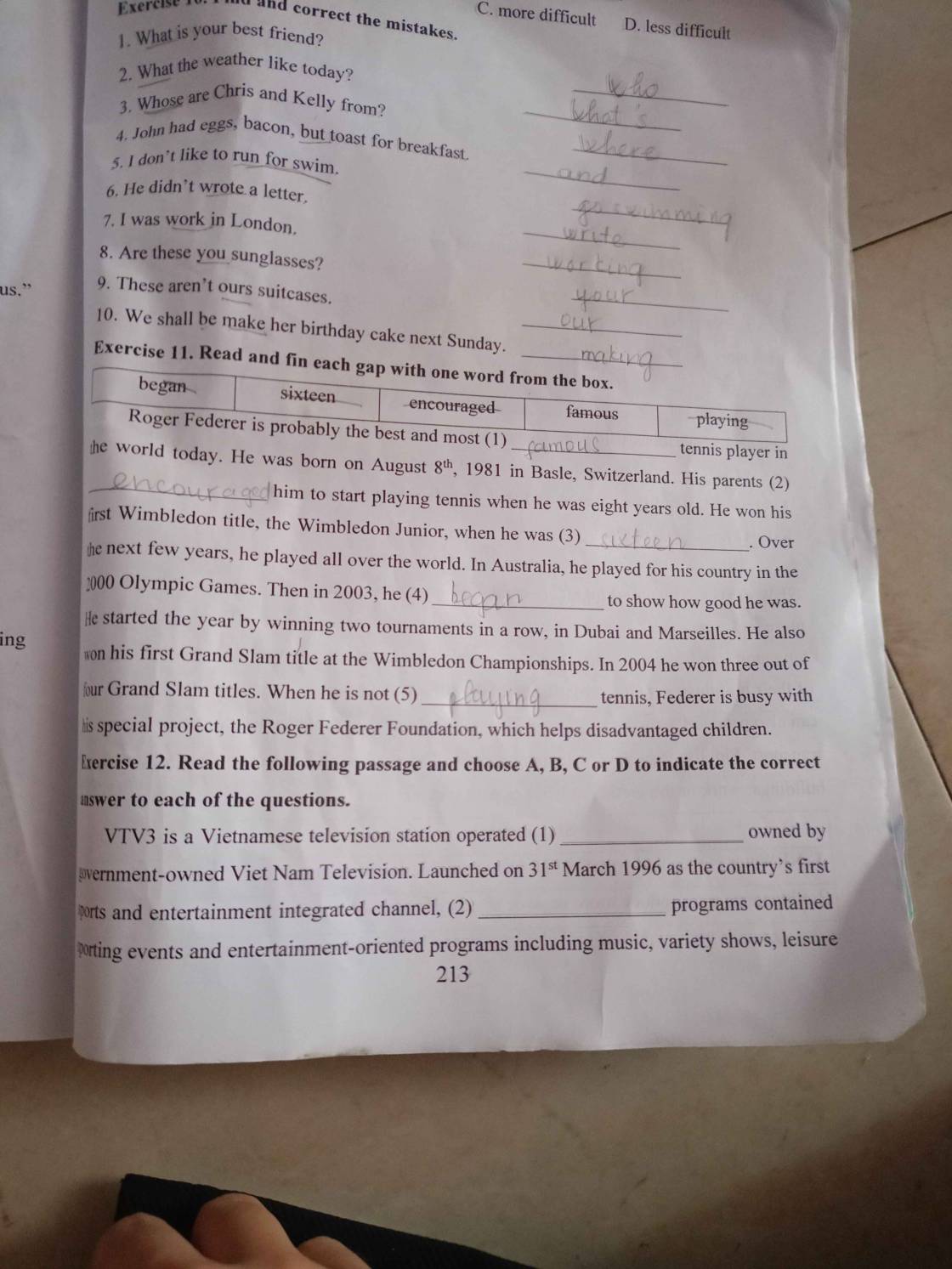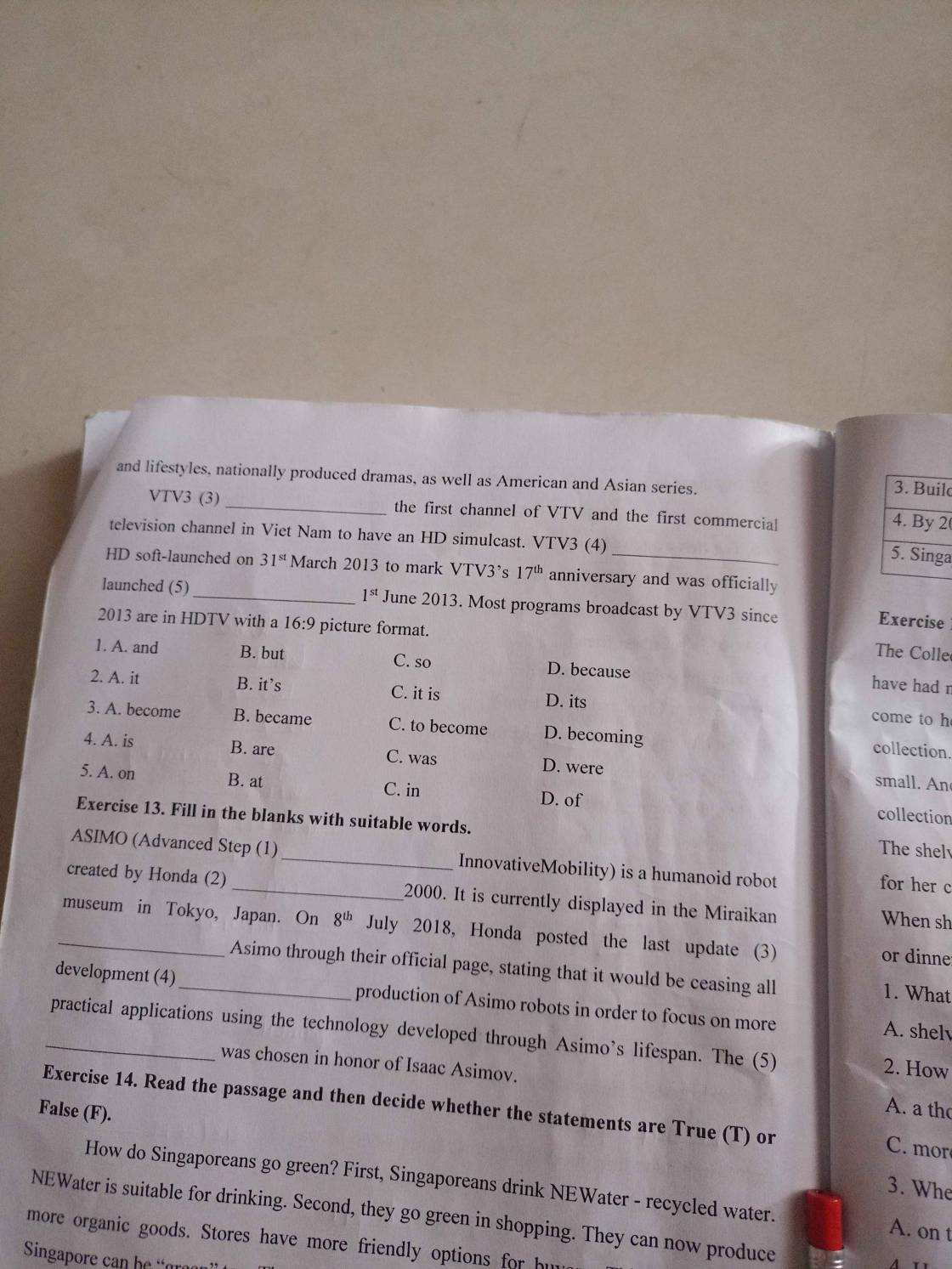In about 80 - 100 words, write a paragraph about the benefits of face-to-face learning, following the guidelines below (1pt) + interact with teachers and classmates face to face + connect with other students and help solve problems more quickly + have fewer distractions in class than at home.....
Hãy nhập câu hỏi của bạn vào đây, nếu là tài khoản VIP, bạn sẽ được ưu tiên trả lời.

1. triệu tập
2. khí quản
3. mùa xuân
4. tổng
5. phép trừ
tui giai
1. tổng hợp
2.ống gió
3. mùa xuân
4. tổng hợp
5. phép trừ

They are doing their homework. We...
A. doing, too B. are, too C. do,too D.too

The bookshop is between the cinema and the restaurant.
The cinema is between the bookshop and the restaurant .
( câu này sắp xếp các địa điểm như nào cũng đc nhé )


Ôi! Thật là chú mèo đáng yêu(Dễ thương)
Tôi thích mèo, còn bạn có thích mèo không?
Làm ơn hãy giết chúng đi!
Tại sao bạn phải làm điều đó!?
Tôi tức, bạn thật là một người điên.
Bởi vì nó sẽ giết chúng ta.
Nhưng anh ấy trông không giống như 1 người xấu.
Thật dễ thương, dễ thương, dễ thương, dễ thương.
tick cho mik nha bn. Đảm bảo mik ko tra chj google lun

- The use of energy sources may be leads to air pollution, climate change, water pollution, thermal pollution,... But in my city, people use energy properly everyday so we haven't seen any problems yet.
* ở nơi mình sống là thế, nên bạn thay sao cho phù hợp với nơi bạn sống nhé!
- I think we can save energy by using fewer household electrical appliances, use energy economically, turn off all lights, fans, air conditioner when not use, etc.
Question 1:
In my city, there are several potential problems associated with the use of energy sources:
1. Pollution: The burning of fossil fuels for energy production can release harmful pollutants into the air, leading to air pollution and contributing to climate change. This pollution can have adverse effects on public health and the environment.
2. Resource Depletion: Dependence on finite resources like coal, oil, and natural gas for energy generation can lead to resource depletion over time. As these resources become scarcer, it may lead to price increases and economic instability.
3. Environmental Degradation: Extracting and processing fossil fuels can cause environmental degradation, such as deforestation, habitat destruction, and water pollution. This can harm ecosystems and biodiversity, disrupting natural balances.
4. Greenhouse Gas Emissions: The combustion of fossil fuels releases greenhouse gases like carbon dioxide into the atmosphere, contributing to global warming and climate change. This can lead to more frequent and severe weather events, rising sea levels, and disruptions to ecosystems and human societies.
5. Energy Inefficiency: Some energy sources, such as older power plants or outdated infrastructure, may be inefficient in converting fuel into usable energy. This inefficiency leads to wastage of resources and higher energy costs for consumers.
6. Dependency on Imports: If a city relies heavily on imported energy sources, such as oil or natural gas, it becomes vulnerable to price fluctuations and geopolitical tensions in supplier countries. Diversifying energy sources and investing in local renewable energy can help reduce this dependency.
Addressing these problems requires a shift towards cleaner and more sustainable energy sources, such as renewable energy (solar, wind, hydroelectric) and increased energy efficiency measures. Transitioning to these alternatives can mitigate environmental impacts, enhance energy security, and promote economic development.
Question 2:
In my city, there are several ways to save energy sources:
1. Saving electricity: Turn off lights, fans, and electronic devices when not in use to save electricity. Use energy-efficient LED bulbs instead of traditional incandescent bulbs.
2. Using renewable energy: Encourage the use of renewable energy sources such as solar panels and wind turbines to generate electricity. These sources are sustainable and do not deplete natural resources.
3. Using public transportation: Use public transportation such as buses or trains instead of personal vehicles to reduce fuel consumption and air pollution. Walking or biking for short distances is also a good way to save energy.
4. Conserving water: Saving water also helps save energy because energy is used to pump, treat, and heat water. Take shorter showers, fix leaks, and use water-saving devices to conserve water.
5. Insulating homes: Properly insulating homes can reduce the need for heating and cooling, saving energy. Install insulation in walls, ceilings, and floors, and use energy-efficient windows and doors to keep homes comfortable.
6. Planting trees: Trees provide shade and reduce the need for air conditioning in buildings, saving energy. Planting trees in cities helps cool the environment and improve air quality.
By implementing these measures, we can effectively save energy sources and create a more sustainable city for the future.

